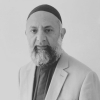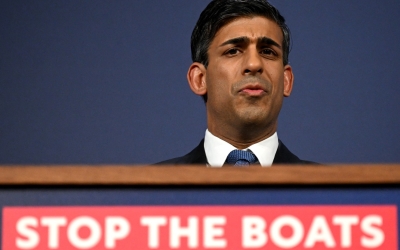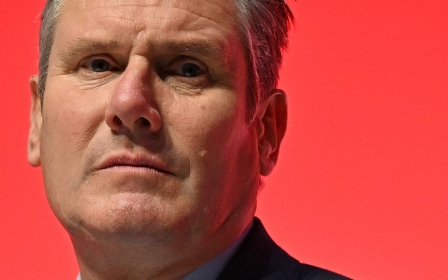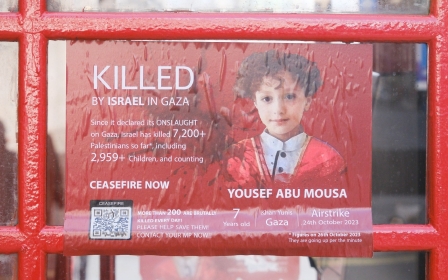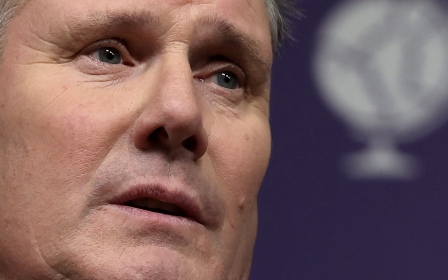Israel-Palestine war: How Braverman is fuelling UK Islamophobia
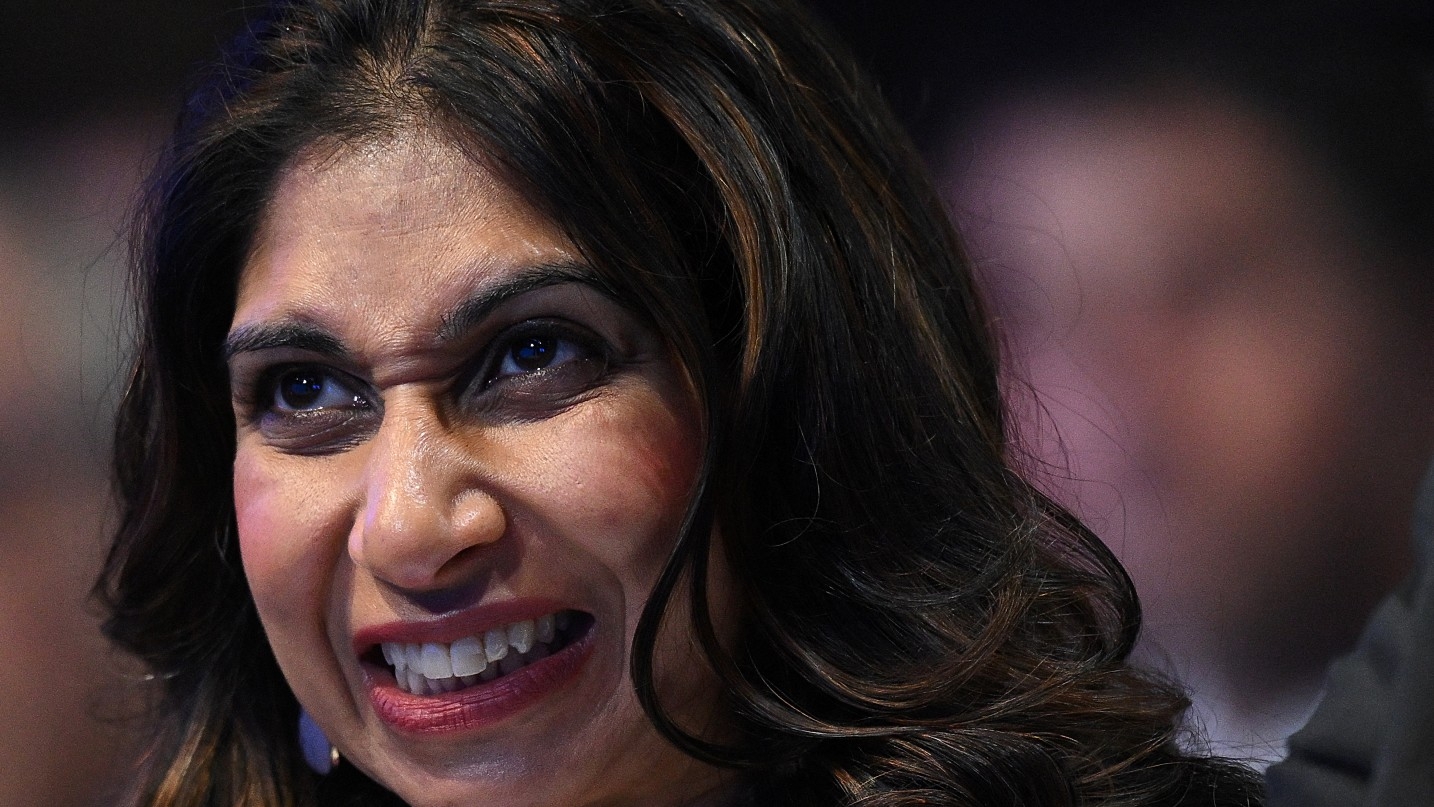
As Israel intensifies its massacre of Palestinians in Gaza, an institutionally Islamophobic narrative is being promoted in the UK.
Almost immediately after the conflict erupted, Home Secretary Suella Braverman stigmatised those seeking justice and peace, advising British police to consider whether flying the Palestinian flag or chanting slogans could be criminalised.
The threat was veiled behind the cloak of legitimate concerns over increasing antisemitism. She was also ready to ban the protest scheduled on Armistice Day calling for a ceasefire.
While November is Islamophobia Awareness Month, it goes without saying that the government needs to police all types of racism. Yet, Braverman is equating antisemitism with those seeking justice for Palestinians.
This framing reduces community relations in the UK to a zero-sum game; one's gains is another's loss. Such polarisation is grossly negligent when it comes to community cohesion and feeds into cultural wars between British Jews who support Israel and British Muslims who support Palestine.
The Muslim Council of Britain has said that Braverman’s “escalating extremist language” is fuelling Islamophobia. But the home secretary is not new to this type of controversy.
Earlier this year, Tory peer Sayeeda Warsi said that Braverman’s rhetoric on grooming gangs, in which she singled out British Pakistani males as the primary culprits, amounted to “race-baiting”.
Overlooking data from the Home Office itself, which found that group-based child sexual exploitation offenders were most commonly white, Braverman endorsed an Islamophobic trope of Muslim men as dangerous sexual predators.
Right-wing politics
Braverman’s right-wing politics have also seen her flirting with “Great Replacement” tropes, a belief system that revolves around fears that migrants (read: Muslims) flocking towards Europe will result in the eradication of white people. One of the disciples of the Great Replacement theory in 2019 carried out a massacre of 51 innocent Muslims at a New Zealand mosque.
In addition, Braverman has championed political commentator Douglas Murray, whose record of Islamophobic statements includes a recommendation that “conditions for Muslims in Europe must be made harder across the board”, a reference to Islam as an “opportunist infection”, and a description of Muslims as a “demographic time bomb”.
Follow Middle East Eye's live coverage for the latest on the Israel-Palestine war
With the ongoing Israeli assault on Gaza, Braverman has intensified her undermining of Muslims, branding peaceful demonstrations for Palestine as “hate marches” - effectively maligning the Palestinian cause by equating it with fanaticism and violence.
Such views have gained traction in mainstream media, with a former Downing Street chief of staff writing an alarmist column titled: “British society will pay a terrible price for indulging extremism.”
Braverman brings to mind former MP Enoch Powell and his infamous 'Rivers of Blood' speech
Braverman’s racist rhetoric has led London Mayor Sadiq Khan to accuse her of “posturing”. He also described her incendiary article in The Times this week as "inaccurate, inflammatory and irresponsible".
This type of political grandstanding supports the institutional narrative in Israel, where Jews showing support for Palestinians have been bullied and beaten. Even Jewish journalists reporting objectively on the conflict have been attacked by mobs and forced to go into hiding.
An Israeli bill was also advanced earlier this year to impose a one-year jail term for displaying Palestinian flags, while police in Jerusalem’s Old City have banned businesses from selling items featuring the flag and other Palestinian national symbols.
Echo chamber
Braverman has provided an echo chamber for these draconian Israeli policies. Portraying pro-Palestinian protesters as terrorist sympathisers fits with the post-“war on terror” era, wherein Muslims are projected as hate-filled extremists who must be avoided and policed.
Besides providing fodder for racist Islamophobes, such rhetoric also aims to discourage non-Muslims from coming out to champion justice for Palestinians.
Cheered on by the likes of Braverman, the notion of the Muslim figure as radical, angry, dangerous and thus deserving of lesser rights has been spreading across Britain. Muslim students, workers and businesses have been left in a state of anxiety, doubting whether they are considered equals in the country.
The situation has created a hierarchy of rights, with Muslims shoved to the bottom. Even worse, British anti-Muslim policies, like Israel’s apartheid system, have been disguised under a facade of “security”.
Earlier this year, a number of senior Conservatives accused Braverman of employing “racist rhetoric”. She brings to mind former MP Enoch Powell and his infamous “Rivers of Blood” speech; Powell motivated a generation of white supremacists through the 1970s and ’80s. The subsequent upsurge in discrimination and marginalisation of ethnic minorities led to attacks and riots across Britain.
Today, Braverman is treading the same racist path, but in this case, the effect is to advance Israeli apartheid, colonisation and massacres at the expense of suppressing the democratic rights of Muslims and people from all walks of life who are pro-Palestinian and pro-peace. This is surely inspiring a new generation of racist Islamophobes.
The views expressed in this article belong to the authors and do not necessarily reflect the editorial policy of Middle East Eye.
Middle East Eye propose une couverture et une analyse indépendantes et incomparables du Moyen-Orient, de l’Afrique du Nord et d’autres régions du monde. Pour en savoir plus sur la reprise de ce contenu et les frais qui s’appliquent, veuillez remplir ce formulaire [en anglais]. Pour en savoir plus sur MEE, cliquez ici [en anglais].


